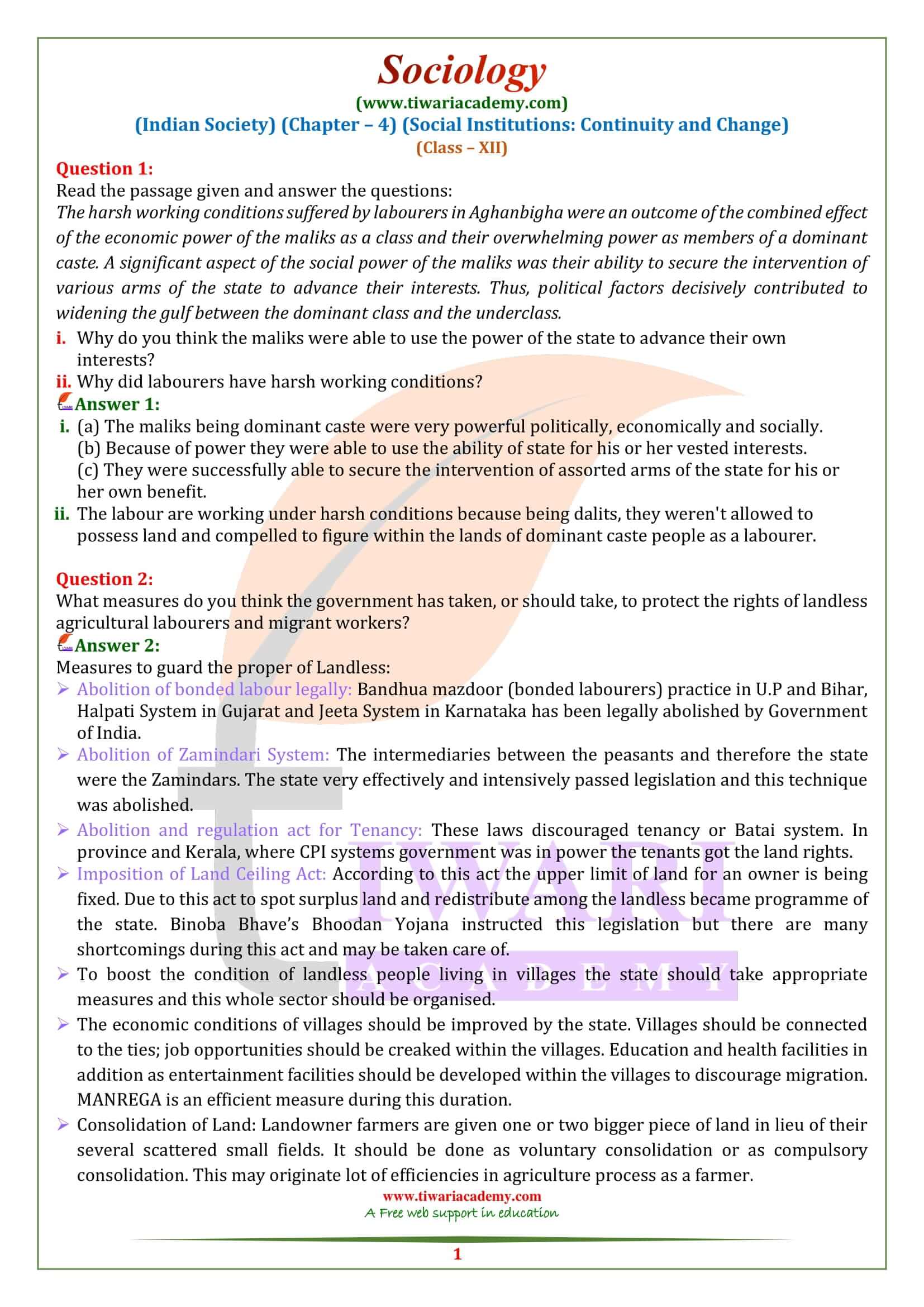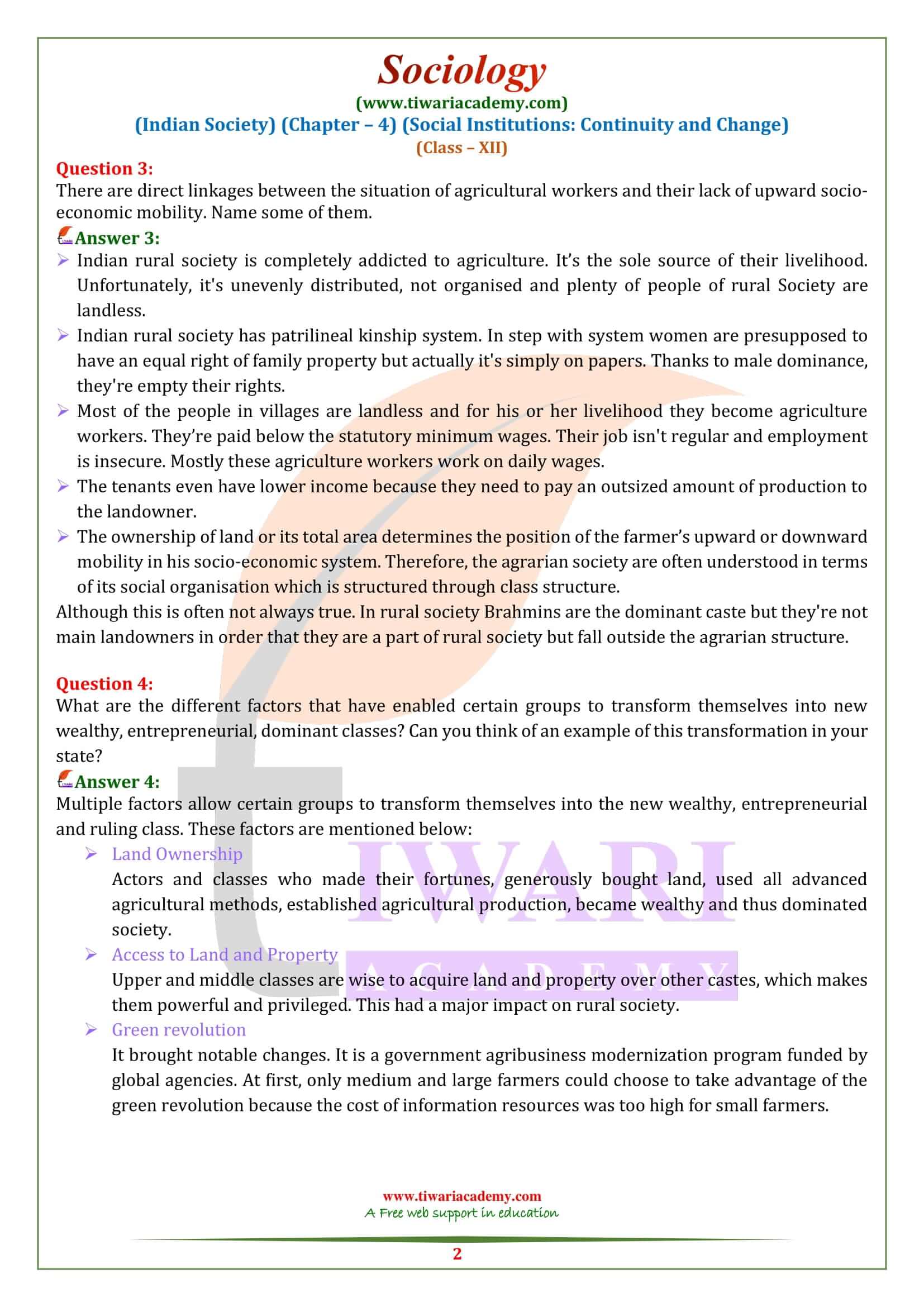NCERT Solutions for Class 12 Sociology Chapter 4 the Market as a Social Institution in English Medium updated for CBSE and State board session 2025-26. Students of class 12 can practice here with MCQ and extra question answers of part 1 sociology Indian Society chapter 4.
Class 12 Sociology Chapter 4 the Market as a Social Institution Question Answers
What measures do you think the government has taken, or should take, to protect the rights of landless agricultural labourers and migrant workers?
Measures to guard the proper of Landless:
Abolition of bonded labour legally: Bandhua mazdoor (bonded labourers) practice in U.P and Bihar, Halpati System in Gujarat and Jeeta System in Karnataka has been legally abolished by Government of India.
Abolition of Zamindari System: The intermediaries between the peasants and therefore the state were the Zamindars. The state very effectively and intensively passed legislation and this technique was abolished.
Abolition and regulation act for Tenancy: These laws discouraged tenancy or Batai system. In province and Kerala, where CPI systems government was in power the tenants got the land rights.
Imposition of Land Ceiling Act: According to this act the upper limit of land for an owner is being fixed. Due to this act to spot surplus land and redistribute among the landless became programme of the state. Binoba Bhave’s Bhoodan Yojana instructed this legislation but there are many shortcomings during this act and may be taken care of.
To boost the condition of landless people living in villages the state should take appropriate measures and this whole sector should be organised.
The economic conditions of villages should be improved by the state. Villages should be connected to the ties; job opportunities should be creaked within the villages. Education and health facilities in addition as entertainment facilities should be developed within the villages to discourage migration. MANREGA is an efficient measure during this duration.
Consolidation of Land: Landowner farmers are given one or two bigger piece of land in lieu of their several scattered small fields. It should be done as voluntary consolidation or as compulsory consolidation. This may originate lot of efficiencies in agriculture process as a farmer.
There are direct linkages between the situation of agricultural workers and their lack of upward socio-economic mobility. Name some of them.
Indian rural society is completely addicted to agriculture. It’s the sole source of their livelihood. Unfortunately, it’s unevenly distributed, not organised and plenty of people of rural Society are landless.
Indian rural society has patrilineal kinship system. In step with system women are presupposed to have an equal right of family property but actually it’s simply on papers. Thanks to male dominance, they’re empty their rights.
Most of the people in villages are landless and for his or her livelihood they become agriculture workers. They’re paid below the statutory minimum wages. Their job isn’t regular and employment is insecure. Mostly these agriculture workers work on daily wages.
The tenants even have lower income because they need to pay an outsized amount of production to the landowner. The ownership of land or its total area determines the position of the farmer’s upward or downward mobility in his socio-economic system. Therefore, the agrarian society are often understood in terms of its social organisation which is structured through class structure.
Although this is often not always true. In rural society Brahmins are the dominant caste but they’re not main landowners in order that they are a part of rural society but fall outside the agrarian structure.
Read the passage given and answer the questions:
The harsh working conditions suffered by labourers in Aghanbigha were an outcome of the combined effect of the economic power of the maliks as a class and their overwhelming power as members of a dominant caste. A significant aspect of the social power of the maliks was their ability to secure the intervention of various arms of the state to advance their interests. Thus, political factors decisively contributed to widening the gulf between the dominant class and the underclass.
i. Why do you think the maliks were able to use the power of the state to advance their own interests?
ii. Why did labourers have harsh working conditions?
Answer:
i. (a) The maliks being dominant caste were very powerful politically, economically and socially.
(b) Because of power they were able to use the ability of state for his or her vested interests.
(c) They were successfully able to secure the intervention of assorted arms of the state for his or her own benefit.
ii. The labour are working under harsh conditions because being dalits, they weren’t allowed to possess land and compelled to figure within the lands of dominant caste people as a labourer.
What are the different factors that have enabled certain groups to transform themselves into new wealthy, entrepreneurial, dominant classes? Can you think of an example of this transformation in your state?
Multiple factors allow certain groups to transform themselves into the new wealthy, entrepreneurial and ruling class. These factors are mentioned below:
Land Ownership
Actors and classes who made their fortunes, generously bought land, used all advanced agricultural methods, established agricultural production, became wealthy and thus dominated society.
Access to Land and Property
Upper and middle classes are wise to acquire land and property over other castes, which makes them powerful and privileged. This had a major impact on rural society.
Green revolution
It brought notable changes. It is a government agribusiness modernization program funded by global agencies. At first, only medium and large farmers could choose to take advantage of the green revolution because the cost of information resources was too high for small farmers.
How should chapter 4 of sociology class 12 be studied for thorough understanding?
From understanding the basic terms like Market, commodity, consumption, tribal market, Fast pace market, market during colonial period, you should try and understand the concept of capitalism and its advantages and disadvantages. Finally, understand the working of Liberlisations, Privatisation and Globalisation.
Are the terms Liberalisation. Privatisation and Globalisation interlinked with chapter 4 sociology?
Yes, after the economic reforms process started in 1991, these three terms occupied center stage in the Indian economy. Almost all economies in the World today are open economies. Government’s are concentrating on building strategies for development and allowing trades to flourishes the policy of LPG.
What are some terms used commonly in economies as well as in chapter 4 of class 12th sociology?
Markets, Globalisation, support price, Hundi, liberalization, Laissez faire, BPO, marketisaton.



